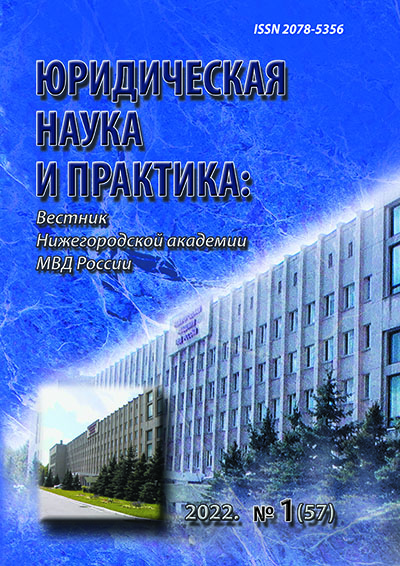The article deals with the problem of conducting investigative actions using remote technologies. The author analyzes the approach of the legislator, the law enforcement officer and the criminal procedure doctrine to the possibility of conducting investigative actions related to obtaining testimony using videoconferencing. The analysis of the points of view of scientists proposing to supplement the Criminal Procedure Code of the Russian Federation with norms regulating the procedure and grounds for conducting remote investigative actions is given. It is concluded that there is no such need and it is proposed to remove the problem under consideration by means of explanations formulated in the legal positions of the Plenum of the Supreme Court of the Russian Federation, since the Code of Criminal Procedure of the Russian Federation contains all the necessary norms to be applied in the situation under consideration.
investigative actions, video conferencing, remote conduct of investigative actions, impossibility of signing the protocol, participation of witnesses, right to protection, restriction of rights and legitimate interests
1. Afanasyeva A. A. Remote interrogation: state and prospects. Bulletin of the Kazan Law Institute of the Ministry of Internal Affairs of Russia, 2021, no. 3 (45). URL: https://cyberleninka.ru/article/n/distantsionnyy-dopros-sostoyanie-i-perspektivy (accessed 22.11.2021). (In Russ.)
2. Poddubnyak A. A., Evdokimova I. S. Interrogation of a witness by means of video conferencing at the stage of preliminary investigation as a novella of Russian legislation. Scientific notes of the V. I. Vernadsky Crimean Federal University. Legal sciences, 2018, no. 3. URL: https://cyberleninka.ru/article/n/dopros-svidetelya-posredstvom-video-konferents-svyazi-na-stadii-predvaritelnogo-rassledovaniya-kak-novella-rossiyskogo (accessed 22.11.2021). (In Russ.)
3. Zheltobryukhov S. P. On the need to provide the preliminary investigation body with the possibility of using videoconferencing at the stage of pre-trial proceedings. Russian justice, 2016, no. 1, pp. 63-64. (In Russ.)
4. Martynov A. N., Kravets E. G., Shuvalov N. V. Organizational and tactical module of remote investigative actions. Criminological problems of law enforcement: Proceedings of the Academy of Management of the Ministry of Internal Affairs of Russia, 2017, no. 4 (44), pp. 128-129. (In Russ.)
5. Shcherba S. P., Arkhipova E. A. The use of video conferencing in criminal proceedings in Russia and foreign countries: experience, problems, prospects: monograph. Moscow: Yurlitinform Publ., 2016. 216 p. (In Russ.)
6. Budnikov V. L. Video evidence in the criminal process of Russia. Journal Legal aspect, 2010, no. 9, pp. 15-17. (In Russ.)
7. Novikov S. A. Interrogation using videoconferencing systems: tomorrow of the Russian preliminary investigation. URL: http://vuzirossii.ru/publ/dopros/16-1-0-1842 (accessed 22.11.2021). (In Russ.)
8. On amendments to the Criminal procedure code of the Russian Federation: federal law no. 501-FZ of December 30, 2021. URL: http://www.consultant.ru/document/cons_doc_LAW_405493/ (accessed 22.11.2021). (In Russ.)
9. The refusal to accept for consideration the complaint of the citizen Orlov Dmitry Igorevich the violation of his constitutional rights by the provisions of part eight of article 193 of the Criminal procedure code of the Russian Federation: constitutional Court of the Russian Federation no. 1090-Oh of December 18, 2008. URL: https://legalacts.ru/doc/opredelenie-konstitutsionnogo-suda-rf-ot-18122008-n/ (accessed 22.11.2021). (In Russ.)












